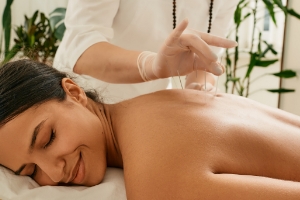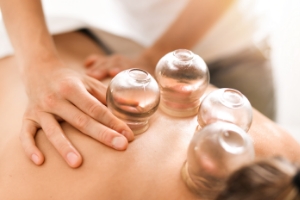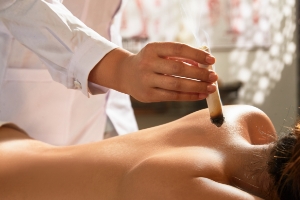No products in the cart.
Back Support (HD)
CLINICAL APPLICATIONS
- Back pain due to herniated disk
- Herniated disk, lumbar radiculopathy, prolapsed or bulging disk, or slipped disk with possible severe back pain, which may worsen with coughing, straining or laughing, tingling or numbness in the legs or feet, muscle spasm or weakness
- Pain originating from the spinal cord and radiating down the legs
WESTERN THERAPEUTIC ACTIONS
- Analgesic effect of relieving pain
- Anti-inflammatory effect of reducing swelling and inflammation
- Spasmolytic effect of relaxing muscles
- Chondroprotective effect to protect the cartilage
- Osteogenic effect of promoting the generation of bones
INGREDIENTS
- Bai Shao (Radix Paeoniae Alba)
- Che Qian Zi (Semen Plantaginis)
- Chuan Niu Xi (Radix Cyathulae)
- Chuan Xiong (Rhizoma Chuanxiong)
- Dan Shen (Radix et Rhizoma Salviae Miltiorrhizae)
- Dang Gui (Radix Angelicae Sinensis)
- Du Zhong (Cortex Eucommiae)
- E Zhu (Rhizoma Curcumae)
- Gan Cao (Radix et Rhizoma Glycyrrhizae)
- Gui Zhi (Ramulus Cinnamomi)
- San Leng (Rhizoma Sparganii)
- Shen Jin Cao (Herba Lycopodii)
- Yan Hu Suo (Rhizoma Corydalis)
- Yi Yi Ren (Semen Coicis)
- Ze Xie (Rhizoma Alismatis)
FORMULA EXPLANATION
Back Support (HD) is designed to treat herniated disks. It contains herbs to activate blood circulation, eliminate blood stasis, reduce swelling and inflammation, strengthen soft tissue, and relieve pain. It is most effective for acute injuries that are mild to moderate in severity.
Dang Gui (Radix Angelicae Sinensis), Chuan Xiong (Rhizoma Chuanxiong), and Dan Shen (Radix et Rhizoma Salviae Miltiorrhizae) tonify blood and activate blood circulation. Yan Hu Suo (Rhizoma Corydalis), San Leng (Rhizoma Sparganii), and E Zhu (Rhizoma Curcumae) are among the most vital pain-relieving herbs that also eliminate blood stasis. Bai Shao (Radix Paeoniae Alba) and Gan Cao (Radix et Rhizoma Glycyrrhizae) nourish yin to relieve muscle spasms and cramps. They also nourish Liver yin and benefit soft tissues. Ze Xie (Rhizoma Alismatis), Che Qian Zi (Semen Plantaginis), and Yi Yi Ren (Semen coicis) drain water accumulation to reduce swelling and inflammation associated with a herniated disk. Shen Jin Cao (Herba Lycopodii) and Gui Zhi (Ramulus Cinnamomi) open the channels and collaterals to unblock obstructions, especially of the extremities, to treat radiating pain and numbness. Du Zhong (Cortex Eucommiae) and Chuan Niu Xi (Radix Cyathulae) are channel-guiding herbs that direct to the back and strengthen soft tissues, such as muscles, tendons, and ligaments. They also tonify the Kidney, dominate the marrow, and directly benefit the bones and disks.
Back Support (HD) is an excellent formula for treating herniated, prolapsed, or slipped disks. It is most effective for acute injuries that are mild to moderate in severity.
Dang Gui (Radix Angelicae Sinensis), Chuan Xiong (Rhizoma Chuanxiong), and Dan Shen (Radix et Rhizoma Salviae Miltiorrhizae) tonify blood and activate blood circulation. Yan Hu Suo (Rhizoma Corydalis), San Leng (Rhizoma Sparganii), and E Zhu (Rhizoma Curcumae) are among the most vital pain-relieving herbs that also eliminate blood stasis. Bai Shao (Radix Paeoniae Alba) and Gan Cao (Radix et Rhizoma Glycyrrhizae) nourish yin to relieve muscle spasms and cramps. They also nourish Liver yin and benefit soft tissues. Ze Xie (Rhizoma Alismatis), Che Qian Zi (Semen Plantaginis), and Yi Yi Ren (Semen coicis) drain water accumulation to reduce swelling and inflammation associated with a herniated disk. Shen Jin Cao (Herba Lycopodii) and Gui Zhi (Ramulus Cinnamomi) open the channels and collaterals to unblock obstructions, especially of the extremities, to treat radiating pain and numbness. Du Zhong (Cortex Eucommiae) and Chuan Niu Xi (Radix Cyathulae) are channel-guiding herbs that direct to the back and strengthen soft tissues, such as muscles, tendons, and ligaments. They also tonify the Kidney, dominate the marrow, and directly benefit the bones and disks.
Back Support (HD) is an excellent formula for treating herniated, prolapsed, or slipped disks. It is most effective for acute injuries that are mild to moderate in severity.
CAUTIONS & CONTRAINDICATIONS
- Because of the blood-invigorating nature of this formula, it is contraindicated during pregnancy and nursing.
- Patients with pain radiating to the extremities accompanied by a sudden loss of bladder or bowel control may have a pinched nerve or spinal injury. They must be referred to emergency care if a specialist has not already evaluated them. This condition, called cauda equina syndrome, can lead to permanent disability and must be assessed and treated immediately.
- This herbal formula contains herbs that invigorate blood circulation, such as Dan Shen (Radix et Rhizoma Salviae Miltiorrhizae) and Dang Gui (Radix Angelicae Sinensis). Therefore, patients on anticoagulant or antiplatelet therapies, such as Coumadin (warfarin), should use this formula with caution, or not at all, as there may be a higher risk of bleeding and bruising.
BACKGROUND
A herniated disk, also known as slipped, prolapsed, or ruptured disk, refers to the damaged disks that cushion the
spine. A herniated disk may be caused by acute injuries to, or regular wear and tear of, the spine. When the disk
becomes herniated and presses on a nerve, it can cause pain, swelling, numbness, weakness, and loss of physical
functions served by the nerve. Optimal treatment should include using herbs and acupuncture to relieve pain and
swelling and using physical medicine (tui-na, adjustment, surgery) to correct the underlying problem.






